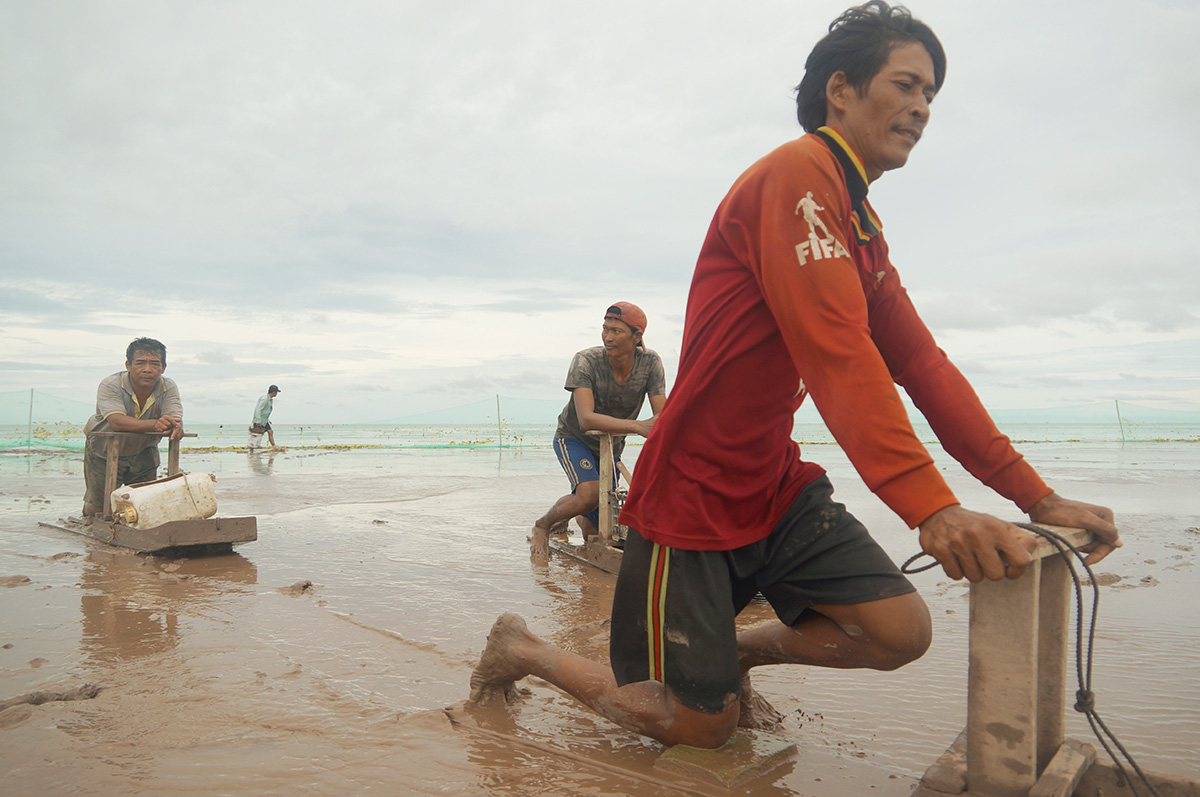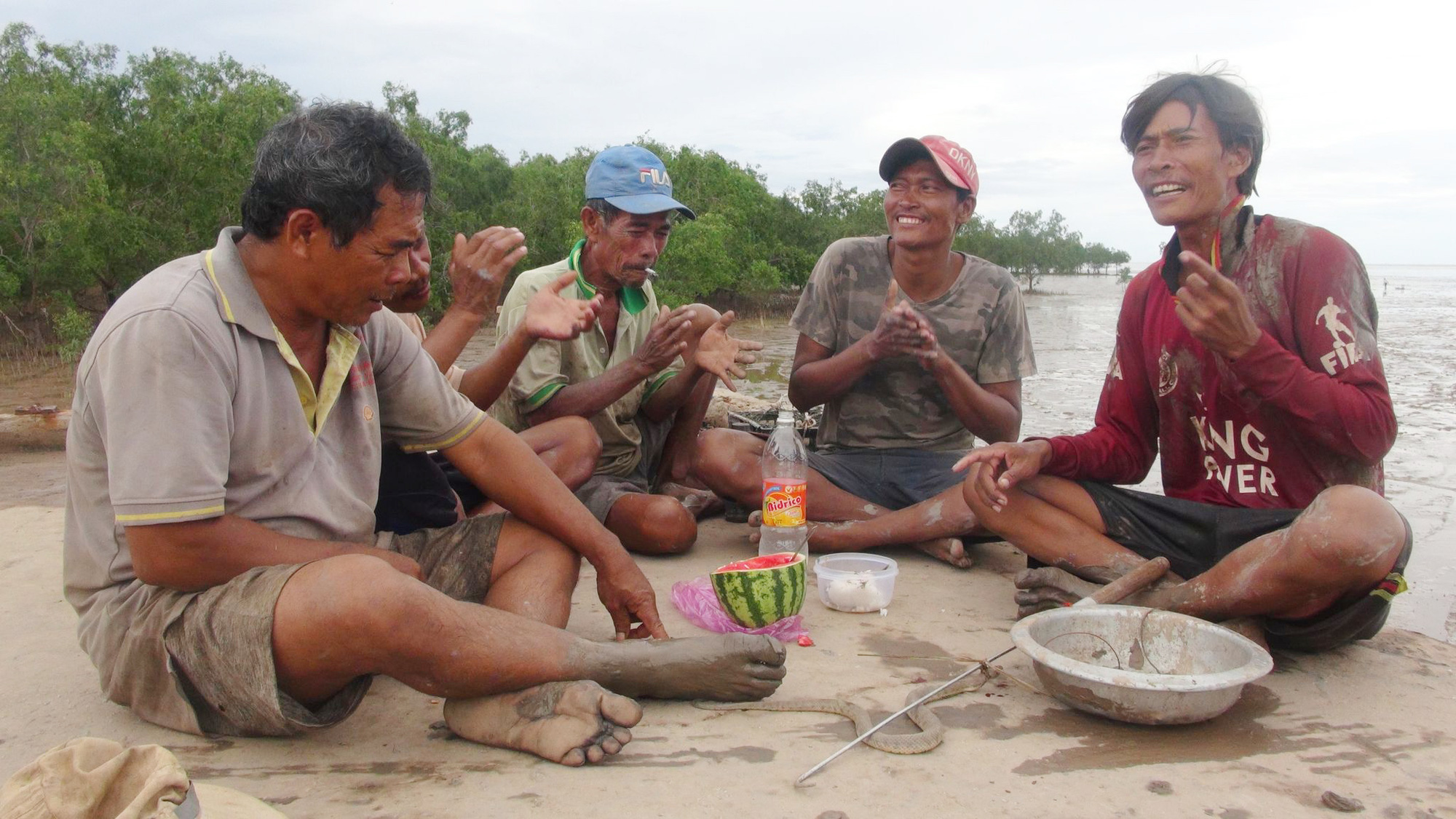Wading through the muddy coast during low tides was not working for a group of fishermen in southern Vietnam so, for generations, they have relied on specially designed wooden skimboards to make a livelihood while sliding up and down the slippery coast.
Mo O Beach spans several kilometers in Soc Trang Province in the Mekong Delta region of southern Vietnam.
For generations, the fishermen here have defied the slippery, muddy beach by making use of homemade wooden skimboards to navigate the sands and store their catch.
Riding the mud skimboards
Tran Co is a fisherman in Mo O Commune, Trung Binh Ward, Tran De District, Soc Trang Province.
His days revolve around navigating the knee-deep mud of Mo O Beach to track down fish.
Using a homemade skimboard, Co slides across the sand by keeping one knee on the board while pushing with the other.
Each push takes him about three meters further down the coast.
To catch fish, he places a few fingers in the tiny holes that litter the beach.
“They’re the main hiding place of the goby. They even dig separate escape routes. They are super smart,” he said.
Using his other hand, he blocks the other exits, pushes his hands in the mud and yanks out two handfuls of goby fish.
Vac, another local fisherman, also catches fish using the same technique, though both men say making a mistake on the job can lead to falling off the board and landing deep in the mud.
|
|
| Tran Co, an experienced mud fisherman along Mo O Beach in Soc Trang Province in Vietnam's Mekong Delta, searches the mud for a catch. Photo: Minh Tam / Tuoi Tre |
The skimboards are not only used for catching fish.
Tang Thai Quan uses his for catching oysters — first by sliding around the mud until he spots mud bubbles, then digging while perched atop his board.
“Each kind of marine animal has its own distinct way of manifesting themselves,” Quan said.
“Bubbles mean oysters, for they open their mouths to breathe.”
According to Quan, it used to be possible to catch dozens of kilograms of marine crabs, goby, and oysters each day, but now local fishermen are lucky if they bring home a meager four kilograms.
It is putting a real strain on the local economy, he explained.
Binh, a 66-year-old oyster catcher who works on Mo O Beach, has her own method of catching oysters.
Instead of waiting for bubbles to rise to the top, she just digs everywhere until she finds some.
“My eyes don’t see clearly, so I can’t tell where the bubbles are. I just have to dive in,” she explained.
Though she is already at an age when most people would like to retire, Binh feels pressured to keep earning a living.
“My son works at a factory in Binh Duong Province. Life is hard for him and his wife, so I just take care of myself,” she said.
Binh Duong, neighboring Ho Chi Minh City, is considered a land of factory workers, as many local and foreign companies build industrial parks there.
Her days consist of few breaks and bad weather does not stop her from hitting the beach in search of oysters.
“We have to brave the weather with this kind of job. We’ll only stay home on very stormy days,” she said, adding that a day’s catch usually brings in enough money to keep her fed.
“I can sell each kilogram for VND70,000 [US$3]. That’s good enough for me.”
|
|
| Binh, a 66-year-old woman with poor eyesight, works each day on the mud to make ends meet along Mo O Beach in Soc Trang Province in Vietnam's Mekong Delta. Photo: Minh Tam / Tuoi Tre |
A tough but fun job
“I’ve done this job since I was 13 years old,” said Lam Ha, a 77-year-old skimboarding fisherman.
“My grandfather said that the 'mong' [the mud skimboard] has been around since the time of my great-grandparents. They came up with the idea because they had no other means to travel many kilometers across the mud,” he said.
According to Dang Van Khai, head of Mo O Commune, the mud skimboarding fisherman households around this neighborhood are extremely underprivileged.
“They have no farmland for agricultural work and no funding to buy a fishing boat, so they stick to their boards,” he said.
“A decade ago, there were around 200 families of skimboarding fishermen, but the number of marine creatures close to shore shrank due to overfishing and environmental pollution so many has left for Ho Chi Minh City to find jobs in factories,” the man continued.
|
|
| Mud skimming fishermen along Mo O Beach in Soc Trang Province in Vietnam's Mekong Delta gather happily after a long day at work. Photo: Tran Ha / Tuoi Tre |
Khai also noted that many of these fishermen are only able to work 10 to 12 days every month, depending on the tides, and their earnings vary greatly from day to day.
When they are not fishing, they pick grass or man shrimp farms.
But despite the hardships, many hold the job near and dear to their hearts.
“Our forefathers left us with the 'mong,' so we keep it for our living,” Tran Co said.
“We may have to tighten our spending and work harder, but we enjoy every minute on the mud.
"It beats working far from our hometown.”
Like us on Facebook or follow us on Twitter to get the latest news about Vietnam!






















































